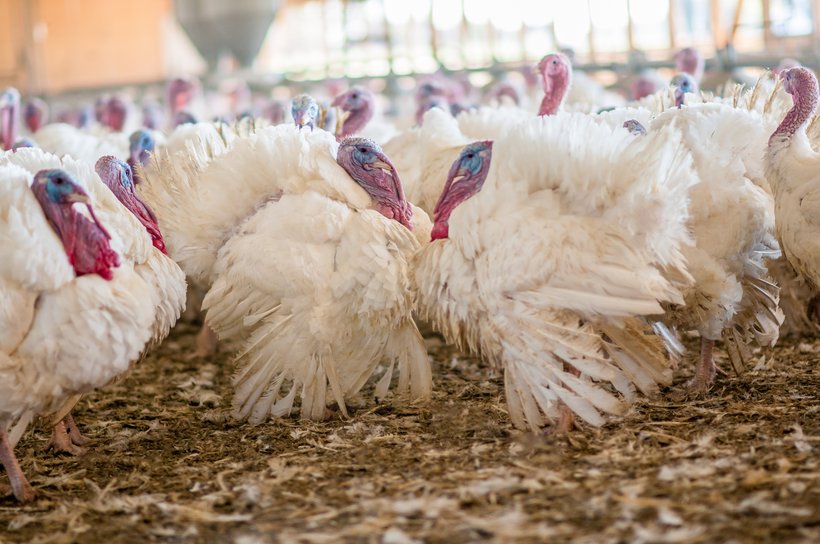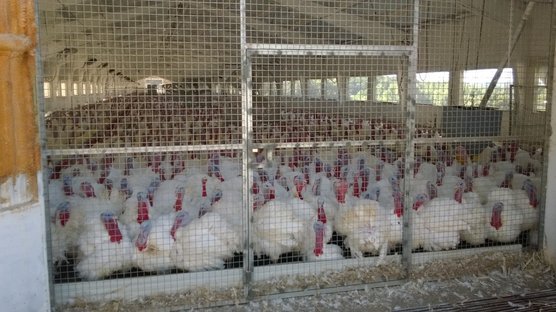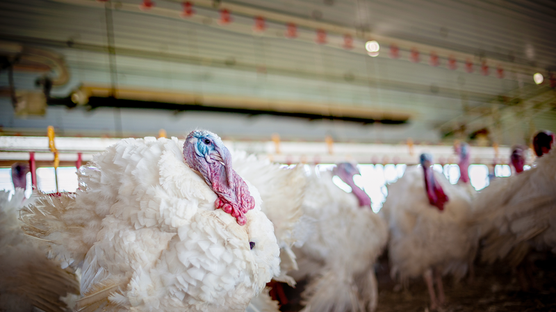
Published on April 6, 2017
Is your fowl acting foul? Check your feed.
Turkeys can sometimes develop aggressive behaviour towards each other and to people during the growing period. Aggressive behaviour can be caused by management factors such as lighting, ventilation, floor space, feeder space, drinker space, litter quality, and gender. Another potential factor? Feed nutrition and composition.
Nutrition plays a vital role in all areas of turkey production so whenever I am asked about a concern on a farm I evaluate the feed nutrition to gain a better understanding of potential causes.
When it comes to aggressive behaviour in turkeys I find there are select ingredients that contribute to or can help combat aggressive behaviour. It is also important to consider feed composition.
Most nutritionists suspect sodium as the first potential cause of aggressive behaviour. While it is unclear why sodium levels contribute to aggressive behaviour in turkeys, it may be due to the role that sodium plays in neural conductance and electrolyte balance. If I suspect sodium is causing aggressive behaviour in a turkey flock, I check the sodium concentration of your feed. If sodium levels are less than 0.15%, I generally recommend that the levels can be increased with either salt or sodium bicarbonate. Before you make any changes on your own farm, be certain to check with a poultry nutritionist so that increases do not negatively compromise your flock health or litter quality in the barn.
Adding magnesium oxide to feed is another method that can help reduce aggressive behaviour in turkeys. This idea comes from the swine industry where magnesium oxide has historically been added to feed to reduce aggression.
An increase in the amount of niacin added to feed can help reduce the severity of aggressive behaviour in turkeys; but this approach can add considerable expense to your feed. It is important to make sure your turkey feed is properly fortified, with all vitamins, before aggressive behaviour appears. This is the best and most cost-effective approach to decreasing the frequency or occurrence of aggression.
Also important is to make sure that amino acids are in proper ratio to each other since severe amino acid imbalances can initiate aggressive behaviour in turkeys; particularly in feeds formulated at lower protein concentrations.
Feed composition can affect aggressive behaviour in turkey flocks. For instance, poor quality added fat or meat meal can negatively affect feed consumption, triggering aggressive behavior. These ingredients, when of poor quality, can contain sufficient peroxides and fatty acids that can destroy added vitamins in feed and also delay digestive system development in young turkey poults. Other feed components such as undigested carbohydrates and protein or mycotoxins, can compromise digestive system health, which can further develop into aggressive behaviour. Excessive heat-processing of feed and poor pellet durability can also contribute to aggressive behaviour.
Aggression can be a frustrating issue for any grower, but with proper nutrition and a healthy environment, growers can keep aggressive behaviour from developing in turkey flocks. When making any changes to your feed, it is always advisable to consult with your feed nutritionist.
Interested in learning more about aggression in turkey flocks and how to prevent it from occurring? Check out the Hybrid resource on the role that feed nutrition has on turkey behaviour here.



